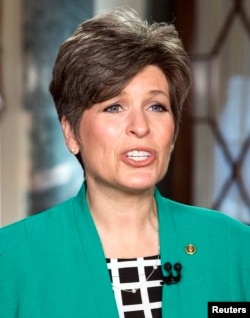President Barack Obama seemed to set a defiant tone Tuesday for the final two years of his presidency in his State of the Union address.
But make no mistake: Republicans were quick to signal their defiance as well, as the president put forward an ambitious domestic agenda that surprised some given how badly his fellow Democrats were beaten in congressional elections back in November.
Obama tried to return to his political roots during his State of the Union address. He reminded members of Congress in the House chamber and Americans watching at home that he came into office in 2009 promising to work to bring the country together in the wake of a devastating economic recession.
And the president made a fresh appeal to end the kind of congressional gridlock that had voters fighting mad last November.
"Imagine if we broke out of these tired old patterns," he said. "Imagine if we did something different. Understand that a better politics isn’t one where Democrats abandon their agenda or Republicans simply embrace mine. A better politics is one where we appeal to each other’s basic decency instead of our basest fears."
Republicans unimpressed
But Republicans don’t seem to be in a mood to buy into the president’s calls for unity and compromise. Fresh off their sweeping election victories last November that gave them full control of Congress, they seem just as determined to push their themes of smaller government and fewer regulations.
Republicans responding to the president’s address also felt duty-bound to remind voters that they won the sweeping victories back in November, not the Democrats.
That was the message from the official Republican responder, new Iowa Senator Joni Ernst, as well as the party’s national chairman, Reince Priebus.
"As the last election made clear, Americans want a less intrusive government that spends their money responsibly," Priebus said in a video. “Yet President Obama gave another speech calling for more taxes and more spending. He is not listening. It is the same old ‘go-it-alone’ approach."
The president is proposing higher investment and inheritance taxes for the very wealthy and then using that revenue to help the middle class. Democrats already have signaled that they intend to make the issue of income disparity a major issue in the 2016 presidential election.
But for Republicans, raising taxes is a nonstarter and they also accuse the president trying to shift the playing field in terms of issues as both parties look ahead to the 2016 presidential election.
Former Republican National Chairman Mike Duncan told VOA that no one in his party is interested in helping another Democrat succeed Obama in the White House in January of 2017.
"Well, there are different ways to have a legacy and the president is choosing, in my opinion, the wrong way," Duncan said. "He could have chosen to work with the Congress and accomplish big ideas and take on big tasks for the country. Unfortunately, he is framing the 2016 election in terms of having a third term of Barack Obama."
Democrats encouraged
But many Democrats seem inspired by the president’s bold approach in dealing with the new Republican majority.
Democratic strategist Elizabeth Sena appeared on VOA’s live television coverage of the State of the Union and said the new Republican majority in Congress will be under pressure to produce in the months ahead to follow through on promises made during last year’s midterm election campaign.
"It places the burden on the Republicans to get something done," she said. "If they have all this power, if they have the majority voted in by the people, then it is their turn now to get something done."
The president’s defiant tone combined with emboldened Republican majorities in both the Senate and House of Representatives sets the stage for what could be a politically contentious final two years of the Obama presidency.
Independent analyst Stuart Rothenberg said that splits within the Republican Party between mainstream Republicans and the Tea Party faction also could hobble the congressional leadership in the months to come.
"We don’t know if there is going to be more compromise because while we had an election that presumably was a rebuke to the president I don’t think he really sees it that way," he said. "And while we had an election that puts Republicans in charge, it’s not clear that as a party there is a single voice coming out of the GOP [Republican Party]."
2016 election looms
Republicans hope to build on their new congressional majorities over the next two years to bolster their case for a Republican to be elected president in 2016, said John Fortier of the Bipartisan Policy Center in Washington.
"And I think they look at 2016 and think they will need a more positive agenda," he said. "That is going to depend a lot on who that candidate is in 2016, but for Republicans in Congress to show that they have a positive vision is one of their great aims."
That Republican presidential field is only beginning to take shape.
The 2016 race has gotten off to an earlier-than expected start with some notable Republicans like former Florida Governor Jeb Bush and 2012 nominee both declaring early interest.
In the next few months others are expected to announce their intentions including New Jersey Governor Chris Christie, Kentucky Senator Rand Paul, Texas Senator Ted Cruz and Florida Senator Marco Rubio.
Former Arkansas Governor Mike Huckabee and former Pennsylvania Senator Rick Santorum also have indicated interest, as have former Texas Governor Rick Perry and Wisconsin Governor Scott Walker.
In short, there will be no shortage of Republican contenders ready to jump into the 2016 race, but no clear frontrunner at the moment.
The picture is much different on the Democratic side, of course, as loyalists wait for the expected announcement from former Secretary of State Hillary Clinton. All signs point to a White House run, though so far the Clinton camp is quiet about when a possible announcement might come.






